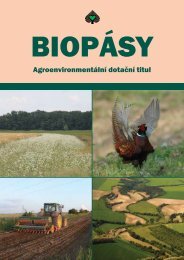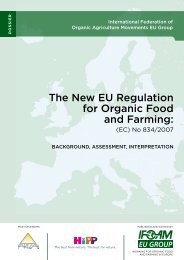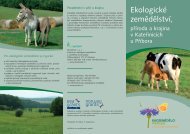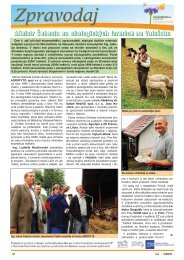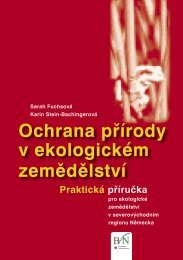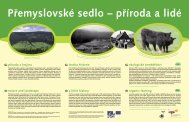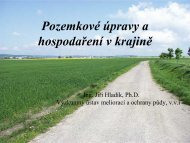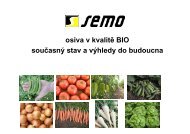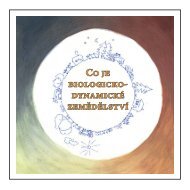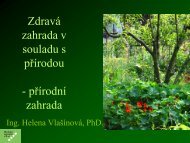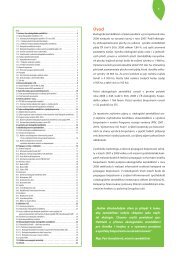Download HERE - Bioinstitut, o.p.s.
Download HERE - Bioinstitut, o.p.s.
Download HERE - Bioinstitut, o.p.s.
Create successful ePaper yourself
Turn your PDF publications into a flip-book with our unique Google optimized e-Paper software.
Organic farming on the Janova hora in Krkonoše Mts.<br />
The Hucul Farm is situated in the village of Vítkovice in the western part of the<br />
Krkonoše Mountains. The Karbusický family organically farms the land area of 300<br />
hectares of sloping meadows and pastures that reach the altitude of 1,100 m above sea<br />
level and are located directly in the Krkonoše National Park. In the 1980’s this farm was<br />
one of two localities in then Czechoslovakia, where intense efforts aimed at preserving<br />
gene pool of Hucul horses were in progress. A herd consisting of eighty horses which is<br />
now grazing on the hillsides around the farm, ranks in terms of its quality and sized<br />
among the best Hucul breeds in the Czech Republic. A typical mountain climate is a<br />
suitable environment also for the Scottish mountain cattle breed Highland. For horses<br />
and cattle, the all-year-round breeding on pastures, even in harsh winter months, is<br />
beneficial. The farm pursues agro-tourism with accommodation in its own boarding<br />
house. The meat of animals slaughtered in the nearby slaughterhouse can be tasted in<br />
a cosy restaurant. The farm produces compost from organic farming raw materials. The<br />
Hucul Farm is an example of an enterprise that fulfils the so-called multifunctional<br />
organic farming model. Theoretical principles of sustainable development are fulfilled<br />
here directly in practice. Benefits of the organic farm a reflected in a wide range of<br />
activities (all-year-round employment in the region where otherwise only seasonal work<br />
is available; agro-tourism; promotion of local products; animal welfare; ecological<br />
education in practice; strengthening direct links between a farmer and a consumer;<br />
recondition horse-riding for handicapped children).<br />
The mountain landscape cultivated for centuries is gradually changing. Regular care for<br />
sloping meadows and pastures with typical taken down stones and walls requires much<br />
efforts that less and less people are nowadays willing to do. The Karbusický family is<br />
one of those few families that keep on farming in this region. Maintaining forest-free<br />
locations by extensive grazing and nature-friendly mowing is essential for preserving<br />
the landscape specifics and for preserving these specific locations that are of vital<br />
importance for many plant and animal species. During the monitoring, the presence of a<br />
number of protected types of plants was approved, such as e.g. orchids from the<br />
Orchideaceae family, several tens of species of hawkweeds of the Hieracium genus, the<br />
Martagon Lily (Lilium martagon), the Willow Gentian (Gentiana asclepiadea), the Spring<br />
Snowflake (Leucojum vernum), the European Common Twayblade (Listera ovata),<br />
Fragran Orchid (Gymnadenia conopsea). Streamlets and waterlogged land are lined<br />
with thistles (Cirsium spp.), marsh marigolds (Caltha spp.), the Wood Club Rush<br />
(Scirpus sylvatica), the Cow Parsley (Chaerophyllum hirsutum), the White Butterbur<br />
(Petasites albus) or the Large Bittercress (Cardamine amara). On meadows the<br />
endangered Corncrake bird (Crex crex) lives, due to whom the farmer postpones the<br />
date of mowing in order that the bird might successfully nest.<br />
<strong>Bioinstitut</strong>, o.p.s. Czech Republic<br />
Křížkovského 8; 781 47 Olomouc; tel. +420 585 631 178, info@bioinstitut.cz




